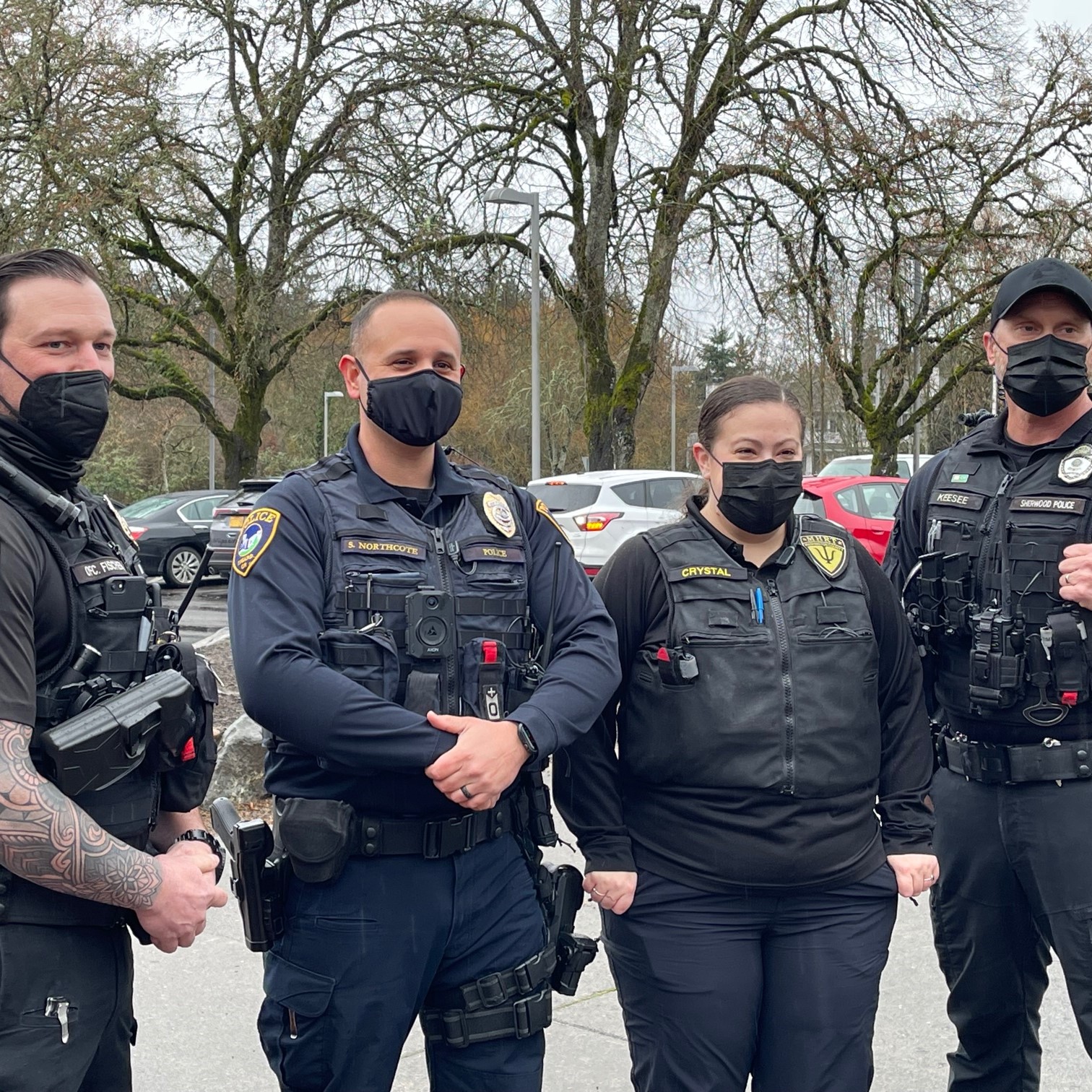
On January 4, Mental Health Response Team (MHRT) Clinician Crystal Fisher met with reporters at a press conference to help get the word out about the importance of this clinical and law enforcement collaboration. She and her law enforcement partners met with four TV stations and two local newspapers.
The MHRT has been serving people in crisis throughout Washington County for years by pairing a deputy with a LifeWorks NW clinician to respond to police calls involving people in crisis. But in mid-2021, the South Cities funded a dedicated team to focus on their area.
“In Tigard alone, roughly 65% of all police calls have a mental or behavioral health component,” says Kelsey Anderson, Tigard Police Department’s PIO. “This represents hundreds of calls for service each and every month. Due to the overwhelming need for additional support, a new MHRT South Cities team was formed over the summer to dedicate one clinician exclusively to Tigard, Tualatin, Sherwood and King City.”
LifeWorks NW’s Crystal Fisher rotates every two weeks to a different city, partnering in Sherwood with Police Officer Adam Keesee, in Tigard with Officer Samuel Northcote, and with Officer Shawn Fischer in Tualatin. Regardless of the schedule, the team may be assigned crisis calls throughout the South Cities region as needed.
The Washington County Sheriff’s Office website shares information about the program, which optimizes care to those in need. The program makes possible a rapid response from the skilled deputy and immediate intervention with LifeWorks NW’s experienced clinician. As a team, there is more opportunity for problem solving on scene and they minimize the risk of a situation escalating. Because of Crystal’s clinical experience and connection to the countywide MHRT, the team can also provide follow-up to ensure individuals get connected to the services and support they need.
Crystal and her rotating officer partners ride together in one patrol car to respond to crisis calls. Clinicians receive training in radio communications and attend defensive tactics training. Clinical staff also wear a ballistic vest at all times while riding with officers, as they may be exposed to volatile and dangerous situations.
Services include face-to-face crisis assessment and evaluation, consultation with families and other professionals, referral for medication evaluation, psychiatric consultation, hospital diversion, stabilization services and follow-up care, referral to appropriate services, flexible funding to assist with emergency housing, transportation or other unmet needs contributing to the crisis episode, and language or culturally specific services.
“We respond to calls that come through 911 or non-emergency that have anything to do with mental health,” says Crystal. “It could be anything from family members concerned that someone might be in danger or somebody is calling in just wanting some help. It could be more severe things; someone needs immediate medical attention. It could be a range from distress to we’ve got to get someone there right now.”
Crystal, who began with the MHRT in September, says that her past 5 years of crisis work has helped her prepare for the MHRT.
“I think the program is really necessary,” says Crystal. “If this program didn’t exist, it could be clinicians going out on their own trying to figure things out. It could be police on their own. I’m really all about collaboration and getting clients what they need in the moment…it’s my passion.”
Asked if she ever feels unsafe, Crystal says no. “Part of our training is learning how to be safe and what things to watch out for. And that is part of why we are paired up with police; they typically assess the situation before a clinician approaches a client. I’ve also had a lot of training in figuring out ‘is a situation safe for me,’ where to put myself, where to not be. You become a team with your partner…I rely on them for the situational awareness and physical safety, and they are relying on me to make the best intervention possible for the client and what they need in the moment.”
The MHRT South Cities team is currently a one-year pilot program operating through an Intergovernmental Agreement (IGA) between Washington County and the cities of Tigard, Tualatin, Sherwood and King City. Their goal is to secure funding to make the South Cities team permanent.
Here are a few of the news stories that came out of the press conference:
KPTV-Fox 12 Program partners police, mental health clinician to respond to crisis calls | Local News | kptv.com
KGW-8 (video) Washington County police partnership with mental health clinicians expands | kgw.com
KGW-8 (article) Partnership between police and mental health clinicians expands | kgw.com
KATU- Four police departments in Washington County team up for mental health response | KATU
KOIN – Clinician responds to 911 mental health calls in Tigard and nearby cities | KOIN.com


